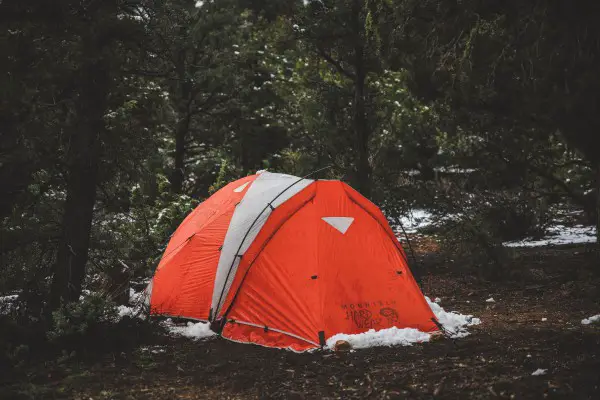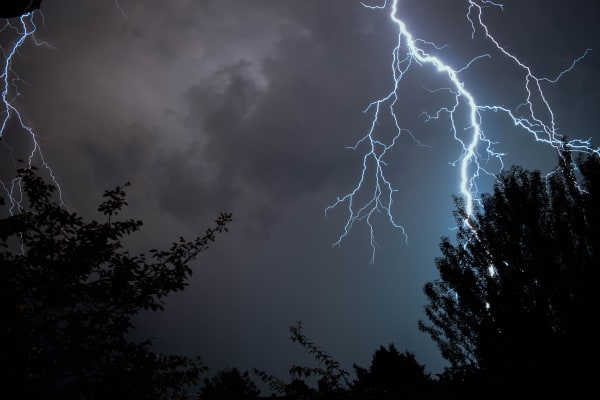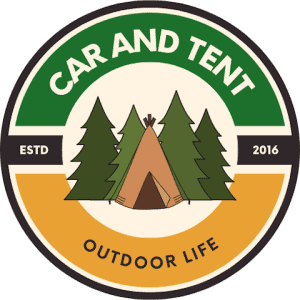
The idea of sleeping in a tent without any hard walls to protect you can feel scary.
In the movies, campers find ax murderers in their tents. Other campers are torn apart by angry bears, mountain lions, and even wolves. A backpacker sleeping in a tent may even have to fend off witches and other supernatural beings.
On top of all of this, there are real dangers that people might have to worry about.
So we have to ask ourselves, is it safe to sleep in a tent? According to statistics provided by the FBI and the Department of Justice, you’re less likely to fall victim to a crime while sleeping in a tent on public land than you are while sleeping at home.
The numbers behind this are quite dramatic too.
In 2014, the National Park Service reported 360 violent crimes. To put this number into perspective, almost 300 million people visited the National Parks that year.
That means you had a .00012% chance of becoming the victim of violent crime in a national park that year. Also, keep in mind that most of the victims of these crimes weren’t sleeping in a tent at the time of their victimhood.
Outside of the parks, there were 1,165,383 violent crimes committed. Out of the 320,000,000 people living in the U.S., this number still isn’t bad but it puts your chance of becoming the victim of a violent crime at .3%. Also, consider that 1 out of 5 of these violent crimes will occur in or around your home.
At this point, we’ve established that it is safe to sleep in a tent so I won’t bore you with any more statistics.
If you like these kinds of statistics, you can find a wealth of information over at FBI.gov, BJS.gov, and NPS.gov.
Table of Contents
How To Stay Safe While Sleeping In A Tent
The real question we have to ask ourselves isn’t whether or not sleeping in a tent is safe. We know sleeping in a tent is almost always safe, so we just need to ask ourselves, how can we make it even safer?
Here are ten tips you can use to stay safe while sleeping in a tent.
- Set your tent up in the right location.
- Don’t bring food into your tent.
- Keep your tent closed at all times.
- Bring your sprays.
- Control your tent’s climate.
- Don’t cause tent fires.
- Choose a low-crime area to camp out in.
- Avoid, evade, and de-escalate.
- Bring your dog with you.
- Avoid camping alone.
Pitching Your Tent
One of the primary dangers of sleeping in a tent is the fact that you don’t have a solid barrier between you and nature. This means you need to be careful not to pitch your tent near trees with dead branches on them or near areas that could be prone to landslides.
You’ll also have to make sure you’re not pitching your tent in an area that is prone to flooding. Low-lying areas like ravines or dried up river beds can quickly and easily wash you away while you sleep.

Of course, pitching your tent high up on a mountain can prove problematic as well. Set your tent up at the highest point during a storm and you’ll dramatically increase your chances of being struck by lightning.
Other things to consider when pitching your tent are your proximity to animal dens, bug nests, and water sources. This means that when you’re beach camping, you’ll want to consider how close you are to the ocean and when you’re in the woods, you’ll want to consider how close you pitch your tent to fire ant nests, hornet nests, and any other creatures that might want to bite or sting you while you sleep.
Dealing With Camp Food
Never bring food into your tent and consider cooking your food away from your tent.
Car campers at a campsite will often have food lockers that they can place their food in. Alternatively, there may be a place for them to string their food up.
Many state and national parks will allow you to cook your food at your campsite but you’ll want to check with your facility before you do.
In the backcountry, I’d advise that you never cook at your campsite. The smells you generate could entice animals to come to visit and the food smells could end up sticking to your tent long after you’ve finished your meal.
Why You Should Keep Your Tent Closed
On a warm day, it might seem practical to leave your tent’s door open to let the warm air out and the cool air in. Don’t give in to this temptation.
Leave your tent’s door open and you’ll be inviting every mosquito, tick, scorpion, spider, and ant in the area to stop on in. You may even get a visit from a local mouse or snake. Neither of these animals makes good house guests.
Bring Your Sprays
Keeping your tent closed isn’t the only thing you can do to keep animals and bugs out. You’ll also want to bring bug and animal sprays with you.
Bear sprays aren’t just for when you’re camping with mountain lions and bears. A good bear spray can help deter people as well as other potentially aggressive animals like wild dogs, coyotes, and wolves.
Control Your Climate
A wet tent can quickly become a deadly tent. See my post titled, “Why Does The Inside Of My Tent Get Wet” for tips on how to keep it dry.
Moisture isn’t the only thing you need to deal with either. Extreme heat and extreme cold can both be hazardous to your health. Learn how to deal with them by visiting my post titled, “Is It Warmer Inside A Tent“.
Also, consider the fact that you don’t necessarily have to make your tent warm in the winter. Instead, you may want to keep the focus on keeping yourself warm.
Remember, it won’t matter if your tent is below freezing if your safe and warm inside of your sleeping bag and sleeping clothes.
Don’t Encourage Fires
The main way to cut down on tent fires is to completely extinguish your fires each night.
A single ember can quickly set your tent ablaze. Luckily, it’s easy to avoid getting burned in your tent while you sleep.
Instead of letting your fire burn itself out, put it out yourself before you head off to bed. Do so by pouring water over it. Anything less and you’ll run the risk of the fire sparking back up even after you think it’s died out.
Another way to avoid tent fires is to refuse to do anything inside your tent that could cause a tent fire. For instance, don’t use your camping stove inside your tent and don’t use a tent heater unless you can do it in safety.
A tent stove can be operated inside of a tent in safety but only if you use the right tent with it.
Also, many people forget that a tent stove can’t be monitored if you go to sleep. Only use a heater in your tent when someone is awake and around to keep an eye on it.
Consider The Crime Rates
State and national parks aren’t the only places you can sleep in a tent. Some people sleep in forest areas, others sleep in private campgrounds, and some people will even sleep on BLM land right alongside the road.
Firstly, don’t sleep alongside of the road. Make sure your tent is set up far enough away from the road that you can’t be seen by passers-by. This one step alone will reduce your chances of falling victim to a random crime of opportunity.
Also, consider looking at crime maps of the areas you’ll be sleeping in. If an area is known for its crime outside of the camping areas, it probably has high crime rates inside of them as well.
Avoid, Evade, and De-escalate
While it isn’t common, some people have been victimized while sleeping in their tents. In some cases, this happened because of something that was said or done earlier in the evening.
For example, a man has an argument with the drunks staying at the campsite next to them. Later on in the night, the drunks decide to attack him in his tent while he’s sleeping.
Avoid situations like this by avoiding the argument in the first place. Evade situations like this by simply packing up and leaving. De-escalate situations like this by making peace before heading off to bed.
Bring Some Company
Your family, your friends, or even your dog can all make sleeping in a tent safer and more enjoyable.
Never considered camping with your dog before? Check out my post on camping with dogs!
Many dogs make great camping and backpacking companions and they bring safety advantages to the table that humans just can’t bring. For example, a dog’s superior hearing and sense of smell could alert you to danger long before any human might recognize the impending threat.
Additional Questions
Is it safe to leave my tent at my campsite?
Most people leave their tents up at their campsite without fear of theft. To steal your tent, a person would have to completely take it down and pack it up before anyone noticed them so there is a high risk of getting caught.
The same rule does not apply to the items inside of your tent. A person could quickly and easily duck into your tent and grab your gear without being noticed. For this reason, it’s always a good idea to take your valuables with you or to lock them up in your car.
Do animals attack tents?
There have been reports of bears, mountain lions, and wolves attacking tents. In fact, there are even reports of large crocodiles pulling people from their tents.
This being said, these incidents are extremely rare and in almost all cases, you’re safer sleeping in a tent than you are sleeping outside of your tent.
Is it safe to sleep outside without a tent?
Sleeping outside without a tent is usually safe but you will have to worry about some things that you wouldn’t have to worry about inside of a tent. For example, a person sleeping without a tent will be more vulnerable to ants, ticks, mosquitos, scorpions, spiders, and snakes.

